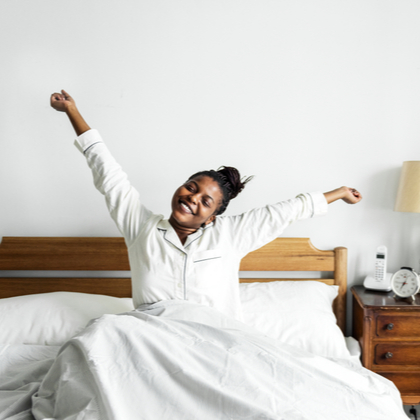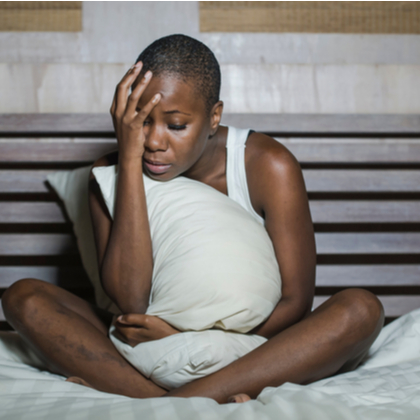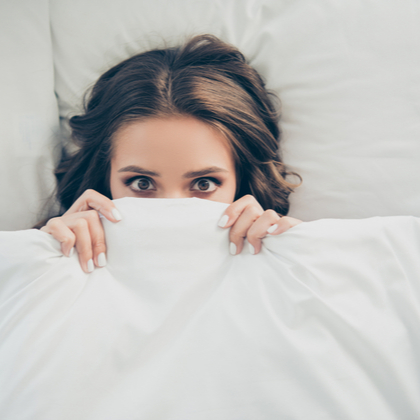
Dreaming still largely mystifies experts and sleep scientists. Although we spend approximately two hours a night dreaming, many of us forget our dreams upon waking. 1 Occasionally, however, we may have a clear recollection of them. These are called vivid dreams.
While vivid dreams are harmless and not usually a cause for concern, they can still be intense and emotionally overwhelming.
Here, we take a closer look at what causes vivid dreams.
What are vivid dreams?
Vivid dreams can be both a positive and negative experience. They can inspire feelings of joy and happiness, so much so that you may wish to return to the fantastical scenario. But they can also be frightening and unsettling enough to disrupt your sleep.

What causes vivid dreams?
REM sleep is the principle stage in which we dream. REM cycles are generally deeper and longer in the morning. That’s why we can, every so often, recall our dreams after waking.
There are many causes of vivid dreams, as we outline below.
Stress and anxiety
Research has found that daytime stress and anxiety can contribute to vivid dreaming with distressing and upsetting content at night.2 Frightening vivid dreams can fragment sleep, which may lead to further anxiety and stress since sleeplessness and mental health challenges are mutually reinforcing.
Alcohol
Alcohol suppresses REM sleep. When you stop drinking, it often leads to unusually intense and vivid dreams.3
Sleep disorders
It’s not uncommon for certain sleep disorders to cause vivid dreaming. Individuals with narcolepsy – characterised by excessive daytime fatigue – often experience strange, vivid dreams.4
Medication
Vivid dreaming can also be a side effect of some medications. One study found beta-blockers and medication for Parkinson’s disease may lead to nightmares.5 Another reported that antidepressants suppressed dream recall but increased the vividness and intensity of dreams when they were recollected.6
Vivid dreams and coronavirus
Sleep scientists generally agree that REM sleep dreaming is a form of emotional first aid that provides overnight mental health therapy.7
In challenging and stressful times, we need more REM sleep to process our emotions. And this might explain why many of us have been experiencing more vivid and bizarre dreams during the coronavirus pandemic, especially those concerning social distancing and COVID-19.
A study of 100 nurses treating COVID-19 patients in Wuhan, China, reported that 45 per cent experienced nightmares – twice the lifetime rate among Chinese psychiatric outpatients and many times greater than the 5 per cent of the general population diagnosed with nightmare disorder.8
The global pandemic has also meant more time spent at home. And relaxed schedules mean people are sleeping longer, which means more opportunities to dream. Sleeping longer proportionally increases REM sleep – the stage in which most emotional, vivid dreams occur.
What hormones cause vivid dreams?
A study conducted at The University of the West of England found that women experience more vivid dreams and nightmares than men.9
Some evidence suggests the spike in the hormone, progesterone, that happens just before menstruation may lead to increased vivid dreaming in women.10
What causes vivid dreams in pregnancy?
The hormonal and physical changes in pregnancy can lead to sleep disruptions, including those caused by vivid dreams.
Researchers have found that pregnant women in their third trimester are more vulnerable to dreaming about upsetting imagery than non-pregnant women.11
Some experts postulate that higher progesterone levels in late pregnancy may be responsible for detailed, vivid dreams.12
Is it normal to have vivid dreams every night?
It’s normal to vividly dream from time to time. Occasionally, you may experience a nightmare – vivid dreams with frightening and distressing content. Though unsettling, experiencing the odd nightmare is normal.
Some people, however, live with nightmare disorder – a condition in which nightmares significantly disrupt your ability to sleep.13 If you experience chronic nightmares and sleep loss, it’s important to have a chat with your GP.
Though dreams continue to perplex sleep experts, REM sleep dreaming is widely understood to support our overall wellbeing. Dreams act as a nocturnal soothing balm that helps process the day’s happenings and take the sharp edges off difficult emotional concerns. And so, it's not uncommon to dream more vividly during periods of high stress and anxiety, such as the ongoing COVID pandemic. Although vivid dreaming can be an intense experience, it’s nothing out of the ordinary. If, however, you have distressing vivid dreams on a regular basis, you may wish to see your GP.
To learn more about supporting your sleep hygiene, please visit the rest of our dedicated Sleep Health Hub.
References:
- Nielsen, T., Stenstrom, P., Takeuchi, T., Saucier, S., Lara-Carrasco, J., Solomonova, E., & Martel, E. (2005). Partial REM-sleep deprivation increases the dream-like quality of mentation from REM sleep and sleep onset. Sleep, 28(9), 1083–1089.
- Sikka P, Pesonen H, Revonsuo A. Peace of mind and anxiety in the waking state are related to the affective content of dreams. Sci Rep. 2018 Aug 24;8(1):12762.
- Colrain, I. M., Nicholas, C. L., & Baker, F. C. (2014). Alcohol and the sleeping brain. Handbook of clinical neurology, 125, 415–431.
- Schiappa, C., Scarpelli, S., D'Atri, A., Gorgoni, M., & De Gennaro, L. (2018). Narcolepsy and emotional experience: a review of the literature. Behavioral and brain functions : BBF, 14(1), 19.
- Novak, M., & Shapiro, C. M. (1997). Drug-induced sleep disturbances. Focus on nonpsychotropic medications. Drug safety, 16(2), 133–149.
- Pace-Schott, E. F., Gersh, T., Silvestri, R., Stickgold, R., Salzman, C., & Hobson, J. A. (2001). SSRI treatment suppresses dream recall frequency but increases subjective dream intensity in normal subjects. Journal of sleep research, 10(2), 129–142.
- Scarpelli, S., Bartolacci, C., D'Atri, A., Gorgoni, M., & De Gennaro, L. (2019). Mental Sleep Activity and Disturbing Dreams in the Lifespan. International journal of environmental research and public health, 16(19), 3658.
- Nielsen, T., 2021. The COVID-19 Pandemic Is Changing Our Dreams. [ONLINE] Scientific American. Available at: https://www.scientificamerican.com/article/the-covid-19-pandemic-is-changing-our-dreams/
- Info.uwe.ac.uk. 2021. Study shows women have more nightmares than men - UWE Bristol: News Releases. [ONLINE] Available at: https://info.uwe.ac.uk/news/uwenews/news.aspx?id=1415
- Sharkey, K., Crawford, S., Kim, S. and Joffe, H., 2014. Objective sleep interruption and reproductive hormone dynamics in the menstrual cycle. Sleep Medicine, 15(6), .688-693.
- Lara-Carrasco, J., Simard, V., Saint-Onge, K., Lamoureux-Tremblay, V., & Nielsen, T. (2014). Disturbed dreaming during the third trimester of pregnancy. Sleep medicine, 15(6), 694–700.
- Izci-Balserak, B., Keenan, B. T., Corbitt, C., Staley, B., Perlis, M., & Pien, G. W. (2018). Changes in Sleep Characteristics and Breathing Parameters During Sleep in Early and Late Pregnancy. Journal of clinical sleep medicine : JCSM : official publication of the American Academy of Sleep Medicine, 14(7), 1161–1168.
- American Academy of Sleep Medicine. (2014). The International Classification of Sleep Disorders – Third Edition (ICSD-3). Darien, IL.
Related Posts

Olivia
Olivia Salter has always been an avid health nut. After graduating from the University of Bristol, she began working for a nutritional consultancy where she discovered her passion for all things wellness-related. There, she executed much of the company’s content marketing strategy and found her niche in health writing, publishing articles in Women’s Health, Mind Body Green, Thrive and Psychologies.
View More



